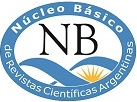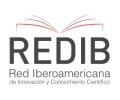Estudio del proceso de separación del licor de hemicelulosas en la biorrefinería de aserrín de algarrobo negro
DOI:
https://doi.org/10.33414/rtyc.44.26-41.2022Palabras clave:
optimización, hemicelulosas, hidrólisis, aserrín algarrobo negro, biorrefineríaResumen
Este trabajo de investigación utilizó como materia prima aserrín de algarrobo negro pretratado, residuo abundante en la región del Nordeste Argentino y su objetivo fue optimizar la tercera etapa de un proceso de biorrefinería. El pretratamiento ácido en los procesos de biorrefinería se utilizó para extraer la máxima cantidad de hemicelulosas, retener la mayor concentración de celulosa en el sólido pretratado y evitar la degradación de los azúcares contenidos en el licor de proceso. Usando un diseño de experimentos central compuesto, se logró la optimización de la extracción de hemicelulosa de aserrín de algarrobo negro lavado parcialmente deslignificado. Los resultados del diseño central compuesto, con dos repeticiones del punto central, han demostrado que es posible obtener licor con un rendimiento de 2,9 % de glucosa solubilizada, 54,5 % de xilosa solubilizada y 0,3 % de xilosa degradada, mediante un proceso óptimo utilizando 1,5 % de H2SO4, 7,7 % de sólidos durante 15,0 min
Descargas
Citas
Alayoubi, R., Mehmood, N., Husson, E., Kouzayha, A., Tabcheh, M., Chaveriat, L., Sarazin, C., Gosselin, I. (2020). Low temperature ionic liquid pretreatment of lignocellulosic biomass to enhance bioethanol yield. Renewable Energy, 145, 1808-1816. https://doi.org/10.1016/j.renene.2019.07.091
Banerjee, S., Patti, A.F., Ranganathan, V., Arora, A. (2019). Hemicellulose based biorefinery from pineapple peel waste: Xylan extraction and its conversion into xylooligosaccharides. Food and Bioproducts Processing, 117, 38-50. https://doi.org/10.1016/j.fbp.2019.06.012
Cai, B.Y., Ge, J.P., Ling, H.Z., Cheng, K.K., Ping, W.X. (2012). Statistical optimization of dilute sulfuric acid pretreatment of corncob for xylose recovery and ethanol production, Biomass and Bioenergy, 36, 250-257. https://doi.org/10.1016/j.biombioe.2011.10.023
Chadni, M., Grimi, N., Bals, O., Ziegler-Devin, I., Brosse, N. (2019). Steam explosion process for the selective extraction of hemicelluloses polymers from spruce sawdust. Industrial Crops and Products, 141, 111757. https://doi.org/10.1016/j.indcrop.2019.111757
Clauser, N.M., Gutiérrez, S., Area, M.C., Felissia, F.E., Vallejos, M.E. (2016). Small-sized biorefineries as strategy to add value to sugarcane bagasse. Chemical Engineering Research and Design, 107, 137-146. https://doi.org/10.1016/j.cherd.2015.10.050
Cuadra, D.E., (2012). Industria maderera y vulnerabilidad socioambiental: el caso de Machagai en el centro del Chaco. En A.M.H. Foschiatti, (Ed), Escenarios vulnerables del Nordeste Argentino. UNNE-CONICET, Resistencia, Chaco, 315-336.
Dagnino, E.P., Chamorro, E.R., Romano, S.D., Felissia, F.E., Area, M.C. (2013a). Optimization of the Pretreatment of Prosopis nigra Sawdust for the Production of Fermentable Sugars. BioResourse, 155, 66-79. https://doi.org/10.1016/j.cherd.2019.12.027
Dagnino, E.P., Chamorro, E.R., Romano, S.D., Felissia, F.E., Area, M.C. (2013b). Optimization of the acid pretreatment of rice hulls to obtain fermentable sugars for bioethanol production. Industrial Crops and Products, 42, 363-368. https://doi.org/10.1016/j.indcrop.2012.06.019
Dagnino, E.P., Chiappero, L.R., Nicolau, V.V., Chamorro, E.R. (2020). Separation process optimisation and characterisation of lignin from black carob tree sawdust into a biorefinery. Chemical Engineering Research and Design, 155, 66-79. https://doi.org/10.1016/j.cherd.2019.12.027
Dagnino, E.P., Ruiz, C., Chamorro, E. (2018). Ensayos preliminares de deslignificación de aserrín de algarrobo negro, en vistas a la producción eficiente de azúcares fermentables. Averma. 22, 06.61-06.66.
Esposito, D., Antonietti, M. (2015). Redefining biorefinery: the search for unconventional building blocks for materials. Chem. Soc. Rev. 44, 5821–5835. 10.1039/C4CS00368C
Guo, B., Zhang, Y., Ha, S.J., Jin, Y.S., Morgenroth, E. (2012). Combined biomimetic and inorganic acids hydrolysis of hemicellulose in Miscanthus for bioethanol production. Bioresource Technology, 110, 278-287. https://doi.org/10.1016/j.biortech.2012.01.133
Jang, S.K., Kim, J.H., Jeong, H., Choi, J.H., Lee, S.M., Choi, I.G. (2018) Investigation of conditions for dilute acid pretreatment for improving xylose solubilization and glucose production by supercritical water hydrolysis from Quercus mongolica. Renewable Energy, 117, 150-156. https://doi.org/10.1016/j.renene.2017.10.015
Jin, Q., Zhang, H., Yan, L., Qu, L., Huang, H. (2011). Kinetic characterization for hemicellulose hydrolysis of corn stover in a dilute acid cycle spray flow-through reactor at moderate conditions. Biomass and Bioenergy. 35, 4158-4164. https://doi.org/10.1016/j.biombioe.2011.06.050
Kim, J.W., Kim, K.S., Lee, J.S., Park, S.M., Cho, H.Y., Park, J.C., Kim, J.S. (2011) Two-stage pretreatment of rice straw using aqueous ammonia and dilute acid. Bioresource Technology, 102, 8992–8999. 10.1016/j.biortech.2011.06.068
Liu, X., Lu, M., Ai, N., Yu, F., Ji, J. (2012) Kinetic model analysis of dilute sulfuric acid-catalyzed hemicellulose hydrolysis in sweet sorghum bagasse for xylose production. Industrial Crops and Products, 38, 81-86. https://doi.org/10.1016/j.indcrop.2012.01.013
Nitsos, C.K., Choli-Papadopoulou, T., Matis, K.A., Triantafyllidis, K.S. (2016). Optimization of hydrothermal pretreatment of hardwood and softwood lignocellulosic residues for selective hemicellulose recovery and improved cellulose enzymatic hydrolysis. ACS Sustainable Chemistry & Engineering, 6, 110-122. https://doi.org/10.1021/acssuschemeng.6b00535
Rafiqul, I.S.M., Sakinah, A.M. (2012) Kinetic studies on acid hydrolysis of Meranti wood sawdust for xylose production. Chemical Engineering Science, 71, 431–437. https://doi.org/10.1016/j.ces.2011.11.007
Vena, P.F., Brienzo, M., García-Aparicio, M., Görgens, J.F., Rypstra, T. (2015) Dilute sulphuric acid extraction of hemicelluloses from Eucalyptus grandis and its effect on Kraft and soda-aq pulp and handsheet properties. Cellulose Chemistry and Technology, 49, 819-832. https://www.cellulosechemtechnol.ro/pdf/CCT9-10(2015)/p.819-832.pdf
Villarreal, M.L.M., Prata, A.M.R., Felipe, M.G.A., Almeida, E., Silva, J.B. (2006) Detoxification procedures of eucalyptus hemicellulose hydrolysate for xylitol production by Candida guilliermondii. Enzyme Microb. Technol. 40, 17-24. https://doi.org/10.1016/j.enzmictec.2005.10.032
Wang, X., Zhuang, J., Jiang, J., Fu, Y., Qin, M., Wang, Z. (2015) Separation and purification of hemicellulose-derived saccharides from wood hydrolysate by combined process. Bioresource Technology, 196, 426-430. https://doi.org/10.1016/j.biortech.2015.07.064
Winkelhausen, E., Kuzmanova, S. (1998) Microbial Conversion of D-xylose to xylitol. Journal of Fermentation and Bioengineering, 86, 1-14. https://doi.org/10.1016/S0922-338X(98)80026-3
Zhang, Y.H.P. (2008) Reviving the carbohydrate economy via multi-product lignocellulose biorefineries. Journal of Industrial Microbiology and Biotechnology, 35, 367–375. https://doi.org/10.1007/s10295-007-0293-6
Descargas
Publicado
Cómo citar
Número
Sección
Licencia
Derechos de autor 2022 Eliana Paola Dagnino, Carlos Raúl Ruíz, Ester Ramona Chamorro, Alfredo Fabián Sequeira

Esta obra está bajo una licencia internacional Creative Commons Atribución-NoComercial 4.0.

















